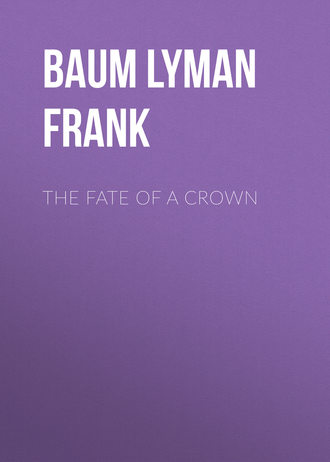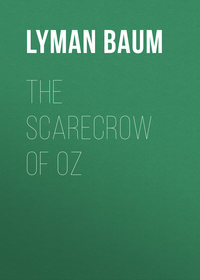 полная версия
полная версияThe Fate of a Crown
And Lesba, sprung from the bluest blood in all the land, had great influence in awakening, in those families she visited, an earnest desire for a republic. Her passionate appeals were constantly inspiring her fellows with an enthusiastic devotion to the cause of liberty, and this talent was duly appreciated by Dom Miguel, whose admiration for the girl’s simple but direct methods of making converts was unbounded.
“Lesba is a rebel to her very finger-tips,” said he, “and her longing to see her country a republic is exceeded by that of no man among us. But we are chary of admitting women to our councils, so my little girl must be content to watch for the great day when the cause of freedom shall prevail.”
However, she constantly surprised me by her intimate knowledge of our progress. As we were riding one day she asked:
“Were you not impressed by your visit to the secret vault?”
“The secret vault!” I exclaimed. “Do you know of it?”
“I can explain every inch of its construction,” she returned, with a laugh; “everything, indeed, save the secret by means of which one may gain admission. Was it not Francisco’s idea? And is it not exceedingly clever?”
“It certainly is,” I admitted.
“It was built by foreign workmen, brought to Brazil secretly, and for that very purpose. Afterward the artisans were sent home again; and not one of them, I believe, could again find his way to my uncle’s house, for every precaution was taken to prevent their discovering its location.”
“That was well done,” said I.
“All that Francisco undertakes is well done,” she answered simply.
This faith in her perplexing brother was so perfect that I never ventured to oppose it. We could not have remained friends had I questioned either his truth or ability.
Madam Izabel I saw but seldom, as she avoided the society of the family and preferred the seclusion of her own apartments. On the rare occasions of our meeting she treated me with frigid courtesy, resenting any attempt upon my part to draw her into conversation.
For a time it grieved me that Dom Miguel’s daughter should regard me with so much obvious dislike and suspicion. Her sad story had impressed me greatly, and I could understand how her proud nature had resented the slanders of Francisco Paola, and writhed under them. But one evening an incident occurred that served to content me with Madame Izabel’s aversion, and led me to suspect that the Minister of Police had not been so guilty as I had deemed him.
It was late, and Dom Miguel had preceded me to the domed chamber while I carried the records and papers to be deposited within the vault.
After raising the first trap my employer, as usual, extinguished the candle. I heard the customary low, grating noise, but before the shooting of the bolts reached my ears there was a sharp report, followed by a vivid flash, and turning instantly I beheld Madam Isabel standing beside us, holding in her hand a lighted match and peering eagerly at the surface of the trap.
My eyes followed hers, and while Dom Miguel stood as if petrified with amazement I saw the glitter of a gold ring protruding from one of the many curious indentations upon the plate. The next instant the match was dashed from her grasp and she gave a low cry of pain.
“Light the candle!” commanded de Pintra’s voice, fiercely.
I obeyed. He was holding the woman fast by her wrist. The ring had disappeared, and the mystery of the trap seemed as inscrutable as ever.
Dom Miguel, greatly excited and muttering imprecations all the way, dragged his daughter through the passage and up the stairs. I followed them silently to the chief’s study. Then, casting the woman from him, de Pintra confronted her with blazing eyes, and demanded:
“How dare you spy upon me?”
Madam Izabel had become cool as her father grew excited. She actually smiled – a hard, bitter smile – as she defiantly looked into his face and answered:
“Spy! You forget, sir, that I am your daughter. I came to your room to seek you. You were not here; but the door to this stairway was displaced, and a cold air came through it. Fearing that some danger menaced you I passed down the stairs until, hearing a noise, I paused to strike a match. You can best explain the contretemps.”
Long and silently Dom Miguel gazed upon his daughter. Then he said, abruptly, “Leave the room!”
She bowed coldly, with a mocking expression in her dark eyes, and withdrew.
As she passed me I noted upon her cheeks an unwonted flush that rendered her strikingly beautiful.
Deep in thought de Pintra paced the floor with nervous strides. Finally he turned toward me.
“What did you see?” he asked, sharply.
“A ring,” I answered. “It lay upon the trap, and the stone was fitted into one of the numerous indentations.”
He passed his hand over his brow with a gesture of despair.
“Then she saw it also,” he murmured, “and my secret is a secret no longer.”
I remained silent, looking upon him curiously, but in deep sympathy.
Suddenly he held out his hand. Upon the little finger was an emerald ring, the stone appearing to be of no exceptional value. Indeed, the trinket was calculated to attract so little attention that I had barely noticed it before, although I remembered that my employer always wore it.
“This,” said he, abruptly, “is the key to the vault.”
I nodded. The truth had flashed upon me the moment Madam Izabel had struck the match. And now, looking at it closely, I saw that the stone was oddly cut, although the fact was not likely to impress one who was ignorant of the purpose for which it was made.
The chief resumed his pacing, but presently paused to say:
“If anything happens to me, my friend, be sure to secure this ring above all else. Get it to Paola, or to Fonseca, or Piexoto as soon as possible – you know where they may be found. Should it fall into the hands of the royalists the result would be fatal.”
“But would either of your associates be able to use the ring, even if it passed into their possession?” I asked.
“There are two hundred indentations in the door of the trap,” answered de Pintra, “and the stone of the ring is so cut that it fits but one of these. Still, if our friends have time to test each cavity, they are sure to find the right one, and then the stone of my ring acts as a key. My real safety, as you will observe, lay in the hope that no one would discover that my ring unlocked the vault. Now that Izabel has learned the truth I must guard the ring as I would my life – more, the lives of all our patriotic band.”
“Since you suspect her loyalty, why do you not send your daughter away?” I suggested.
“I prefer to keep her under my own eye. And, strange as her actions of to-night seem, I still hesitate to believe that my own child would conspire to ruin me.”
“The secret is not your own, sir,” I ventured to say.
“True,” he acknowledged, flushing deeply, “the secret is not my own. It belongs to the Cause. And its discovery would jeopardize the revolution itself. For this reason I shall keep Izabel with me, where, admitting she has the inclination to betray us, she will not have the power.”
After this night he did not extinguish the light when we entered the vault, evidently having decided to trust me fully; but he took pains to secure the trap in the study floor so that no one could follow us. After watching him apply the key several times I became confident that I could find the right indentation without trouble should the occasion ever arise for me to unlock the vault unaided.
Days passed by, and Madam Izabel remained as quiet and reserved as if she had indeed abandoned any further curiosity concerning the secret vault. As for my fellow-rebel, the Senhorita Lesba, I rode and chatted with her in the firm conviction that here, at least, was one secret connected with the revolution of which she was ignorant.
CHAPTER VII
GENERAL FONSECA
One evening, as I entered Dom Miguel’s library, I found myself face to face with a strange visitor. He did not wear a mask, as did so many of the conspirators, even in the chief’s presence; but a long black cloak swept in many folds from his neck to his feet.
My first thought was to marvel at his size, for he was considerably above six feet in height and finely proportioned, so that his presence fairly dominated us and made the furnishings of the room in which he stood seem small and insignificant.
As I entered, he stood with his back to the fireplace confronting Dom Miguel, whose face wore a sad and tired expression. I immediately turned to withdraw, but a gesture from the stranger arrested me.
“Robert,” said Dom Miguel, “I present you to General Manuel Deodoro da Fonseca.”
I bowed profoundly. General Fonseca was not only a commander of the Emperor’s royal army, but Chief Marshal of the forces of the Revolutionary party. I had never seen the great man before, as his duties required his constant presence at the capital; but no figure loomed larger than his in the affairs of the conspiracy.
Seldom have I met with a keener or more disconcerting glance than that which shot from his full black eyes as I stood before him. It seemed to search out my every thought, and I had the sensation of being before a judge who would show no mercy to one who strove to dissemble in his presence.
But the glance was brief, withal. In a moment he had seized my hand and gripped it painfully. Then he turned to Dom Miguel.
“Let me hear the rest of your story,” said he.
“There is nothing more, General. Izabel has learned my secret, it is true; but she is my daughter. I will vouch for her faith.”
“Then will not I!” returned Fonseca, in his deep, vibrant tones. “Never have I believed the tale of her estrangement from that scoundrel, Leon de Mar. Men are seldom traitors, for they dare not face the consequences. Women have no fear of man or devil. They are daughters of Delilah – each and every one.”
He turned suddenly to me.
“Will you also vouch for Senhora Izabel de Mar?” he asked.
“No,” I answered.
“And quite right, sir,” he returned, with a grim smile. “Never trust a woman in politics. But how about Francisco Paola? Do you vouch for him?”
I hesitated, startled by the question.
“Answer me!” he commanded.
“I cannot see that I am required to vouch for any one, General,” said I, nettled by his manner. “I am here to serve the Cause, not to judge the loyalty of its leaders.”
“Ugh!” said he, contemptuously; and I turned my back upon him, facing Dom Miguel, over whose features a fleeting smile passed.
Fonseca stalked up and down the apartment, his sword clanking beneath his cloak, and his spurs clicking like castanets. Then he planted his huge figure before the chief.
“Watch them both,” said he brusquely; “your daughter and your friend. They are aware of our most important secrets.”
De Pintra’s face reddened.
“Francisco is true as steel,” he retorted, firmly. “Not one of us – including yourself, General – has done more to serve the Cause. I have learned to depend upon his discretion as I would upon my own – or yours.”
The general frowned and drew a folded paper from his breast pocket.
“Read that,” said he, tossing it into Dom Miguel’s hand. “It is a copy of the report made by Paola to the Emperor this morning.”
De Pintra glanced at the paper and then gave it to me, at the same time dropping his head in his hands.
I read the report. It stated that the Minister of Police had discovered the existence of a secret vault constructed beneath the mansion of Miguel de Pintra, the rebel chief. This vault, the police thought, contained important records of the conspiracy. It was built of double plates of steel, and the entrance was guarded by a cleverly constructed door, which could only be unlocked by means of a stone set in a ring which was constantly worn by Dom Miguel himself. In conclusion the minister stated that every effort was being made to secure possession of the ring, when the rebels would be at the Emperor’s mercy.
“Well, sir, what do you think of Francisco Paola now?” inquired Fonseca, with a significant smile.
“Did he not himself invent the secret vault?” I asked.
“He did, sir.”
“How long ago.”
“A matter of two years. Is it not so, Dom Miguel?”
The chief bowed.
“And until now Paola has kept this secret?” I continued.
“Until now, yes!” said the general. “Until the vault was stored with all our funds and the complete records of the revolution.”
“Then it seems clear to me that Paola, as Minister of Police, has been driven to make this report in order to serve the Cause.”
Dom Miguel looked up at me quickly, and the huge general snorted and stabbed me with his terrible eyes.
“What do you mean?” demanded Fonseca.
“This report proves, I fear, that our suspicions of Madam Izabel are well founded,” I explained, not daring to look at Dom Miguel while I accused his daughter. “Paola has doubtless discovered that this information regarding the vault and its mysterious key has either been forwarded to the Emperor or is on the way to him. Therefore he has forestalled Madam Izabel’s report, in order that he may prove his department vigilant in serving the government, and so protect his high office. Can you not see that Paola’s claim that he is working to secure the ring is but a ruse to gain time for us? Really, he knows that he could obtain it by arresting Dom Miguel. But this report will prevent the Emperor putting his man Valcour upon the case, which he would probably have done had he received his first information from Izabel de Mar.”
For a moment there was silence. Then the general’s brow unbent and he said with cheerfulness:
“This explanation is entirely reasonable. It would not do for Paola to get himself deposed, or even suspected, at this juncture. A new Minister of Police would redouble our danger.”
“How did you obtain this copy of the report?” asked de Pintra.
“From one of our spies.”
“I have no doubt,” said I, “that Paola was instrumental in sending it to you. It is a warning, gentlemen. We must not delay in acting upon it, and removing our treasure and our records to a safer place.”
“And where is that?” asked Fonseca.
I looked at the chief. He sat thoughtfully considering the matter.
“There is no need of immediate haste,” said he presently, “and nothing can be done to-night, in any event. To-morrow we will pack everything in chests and carry them to Senhor Bastro, who has a safe hiding-place. Meantime, General, you may leave me your men to serve as escort. How many are there?”
“Three. They are now guarding the usual approaches to this house.”
“Let them ride with you to the station at Cruz, and send them back to me in the morning. I will also summon some of our nearby patriots. By noon to-morrow everything will be ready for the transfer.”
“Very good!” ejaculated the general. “We cannot abandon too soon the vault we constructed with so much care. Where is your daughter?”
“In her apartments.”
“Before you leave to-morrow, lock her up and put a guard at her door. We must not let her suspect the removal of the records.”
“It shall be done,” answered de Pintra, with a sigh. “It may be,” he continued, hesitatingly, “that my confidence in Izabel has been misplaced.”
The general did not reply. He folded his cloak about him, glanced at the clock, and strode from the room without a word of farewell.
When he had gone Dom Miguel turned to me.
“Well?” said he.
“I do not like Fonseca,” I answered.
“As a man he is at times rather disagreeable,” admitted the chief. “But as a general he possesses rare ability, and his high station renders him the most valuable leader the Cause can boast. Moreover, Fonseca has risked everything in our enterprise, and may be implicitly trusted. When at last we strike our great blow for freedom, much will depend upon Manuel da Fonseca. And now, Robert, let us retire, for an hour before daybreak we must be at work.”
It was then eleven o’clock. I bade the chief good night and retired to my little room next the study. Dom Miguel slept in a similar apartment opening from the opposite side of the study.
The exciting interview with Fonseca had left me nervous and wakeful, and it was some time before I sank into a restless slumber.
A hand upon my shoulder aroused me.
It was Dom Miguel.
“Come quick, for God’s sake!” he cried, in trembling tones. “She has stolen my ring!”
CHAPTER VIII
A TERRIBLE CRIME
Scarcely awake, I sprang from my couch in time to see de Pintra’s form disappear through the doorway. A moment later I was in the study, which was beginning to lighten with the dawn of a new day.
The trap in the floor was open, and the chief threw himself into the aperture and quickly descended. At once I followed, feeling my way down the iron staircase and along the passage. Reaching the domed chamber a strange sight met our view. Both traps had been raised, the second one standing upright upon its hinged edge, and from the interior of the vault shone a dim light.
While we hesitated the light grew stronger, and soon Madam Izabel came slowly from the vault with a small lamp in one hand and a great bundle of papers in the other. As she reached the chamber Dom Miguel sprang from out the shadow and wrenched the papers from her grasp.
“So, madam!” he cried, “you have betrayed yourself in seeking to betray us. Shame! Shame that a daughter of mine should be guilty of so vile an act!” As he spoke he struck her so sharply across the face with the bundle of papers that she reeled backward and almost dropped the lamp.
“Look to her, Robert,” he said, and leaped into the vault to restore the papers to their place.
Then, while I stood stupidly by, not thinking of any further danger, Madam Izabel sprang to the trap and with one quick movement dashed down the heavy plate of steel. I saw her place the ring in its cavity and heard the shooting of the bolts; and then, suddenly regaining my senses, I rushed forward and seized her arm.
“The ring!” I gasped, in horror; “give me the ring! He will suffocate in that dungeon in a few minutes.”
I can see yet her cold, serpent-like eyes as they glared venomously into my own. The next instant she dashed the lamp into my face. It shivered against the wall, and as I staggered backward the burning oil streamed down my pajamas and turned me into a living pillar of fire.
Screaming with pain, I tore the burning cloth from my body and stamped it into ashes with my bare feet. Then, smarting from the sting of many burns, I looked about me and found myself in darkness and alone.
Instantly the danger that menaced Dom Miguel flashed upon me anew, and I stumbled up the iron stairs until I reached the study, where I set the alarm bell going so fiercely that its deep tones resounded throughout the whole house.
In my chamber I hastily pulled my clothing over my smarting flesh, and as the astonished servants came pouring into the study, I shouted to them:
“Find Senhora de Mar immediately and bring her to me – by force if necessary. She has murdered Dom Miguel!”
Over the heads of the stupidly staring group I saw a white, startled face, and Lesba’s great eyes met my own with a quick look of comprehension. Then she disappeared, and I turned again to the wondering servants.
“Make haste!” I cried. “Can you not understand? Every moment is precious.”
But the frightened creatures gazed upon each other silently, and I thrust them aside and ran through the house in frantic search for the murderess. The rooms were all vacant, and when I reached the entrance hall a groom stopped me.
“Senhora de Mar left the house five minutes ago, sir. She was mounted upon our swiftest horse, and knows every inch of the country. It would be useless to pursue her.”
While I glared at the fellow a soft hand touched my elbow.
“Come!” said Lesba. “Your horse is waiting – I have saddled him myself. Make for the station at Cruz, for Izabel will seek to board the train for Rio.”
She had led me through the door across the broad piazza; and as, half-dazed, I mounted the horse, she added, “Tell me, can I do anything in your absence?”
“Nothing!” I cried, with a sob; “Dom Miguel is locked up in the vault, and I must find the key – the key!”
Away dashed the horse, and over my shoulder I saw her still standing on the steps of the piazza staring after me.
The station at Cruz! I must reach it as soon as possible – before Izabel de Mar should escape. Almost crazed at the thought of my impotency and shuddering at the knowledge that de Pintra was slowly dying in his tomb while I was powerless to assist him, I lashed the good steed until it fairly flew over the uneven road.
“Halt!” cried a stern voice.
The way had led me beneath some overhanging trees, and as I pulled the horse back upon his haunches I caught the gleam of a revolver held by a mounted man whose form was enveloped in a long cloak.
Then came a peal of light laughter.
“Why, ‘tis our Americano!” said the horseman, gayly; “whither away, my gallant cavalier?”
To my delight I recognized Paola’s voice.
“Dom Miguel is imprisoned in the vault!” I almost screamed in my agitation; “and Madam Izabel has stolen the key.”
“Indeed!” he answered. “And where is Senhora Izabel?”
“She has fled to Rio.”
“And left her dear father to die? How unfilial!” he retorted, laughing again. “Do you know, Senhor Harcliffe, it somehow reminds me of a story my nurse used to read me from the ‘Arabian Nights,’ how a fond daughter planned to – ”
“For God’s sake, sir, the man is dying!” I cried, maddened at his indifference.
He drew out a leathern case and calmly selected a cigarette.
“And Madam Izabel has the key,” he repeated, striking a match. “By the way, senhor, where are you bound?”
“To overtake the murderess before she can board the train at Cruz.”
“Very good. How long has Dom Miguel been imprisoned in the vault?”
“Twenty minutes, a half-hour, perhaps.”
“Ah! He may live in that foul and confined atmosphere for two hours; possibly three. But no longer. I know, for I planned the vault myself. And the station at Cruz is a good two hours’ ride from this spot. I know, for I have just traveled it.”
I dropped my head, overwhelmed by despair as the truth was thus brutally thrust upon me. For Dom Miguel there was no hope.
“But the records, sir! We must save them, even if our chief is lost. Should Madam Izabel deliver the key to her husband or to the Emperor every leader of the Cause may perish upon the gallows.”
“Well thought of, on my word,” commented the strange man, again laughing softly. “I wonder how it feels to have a rope around one’s neck and to kick the empty air?” He blew a cloud of smoke from his mouth and watched it float away. “But you are quite right, Senhor Harcliffe. The lady must be found and made to give up the ring.”
He uttered a low whistle, and two men rode out from the shadow of the trees and joined us.
“Ride with Senhor Harcliffe to the station at Cruz. Take there the train for Rio. Present the American to Mazanovitch, who is to obey his instructions.”
The men bowed silently.
“But you, senhor,” I said, eagerly, “can you not yourself assist us in this search?”
“I never work,” was the reply, drawled in his mincing manner. “But the men I have given you will do all that can be done to assist you. For myself, I think I shall ride on to de Pintra’s and kiss my sister good morning. Perhaps she will give me a bite of breakfast, who knows?”
Such heartlessness amazed me. Indeed, the man was past my comprehension.
“And General Fonseca?” said I, hesitating whether or no to put myself under Paola’s command, now that the chief was gone.
“Let Fonseca go to the devil. He would cry ‘I told you so!’ and refuse to aid you, even though his own neck is in jeopardy.” He looked at his watch. “If you delay longer you will miss the train at Cruz. Good morning, senhor. How sad that you cannot breakfast with us!”
Touching his hat with a gesture of mock courtesy he rode slowly on, and the next moment, all irresolution vanishing, I put spurs to my horse and bounded away, the two men following at my heels.
Presently I became tortured with thoughts of Dom Miguel, stifling in his tomb of steel. And under my breath I cursed the heartless sang froid of Francisco Paola, who refused to be serious even when his friend was dying.









